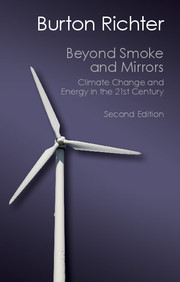Book contents
- Frontmatter
- Contents
- Preface to the Second Edition
- List of Units
- List of Conversion Factors
- List of Abbreviations
- 1 Introduction
- Part I Climate
- Part II Energy
- 6 Taking up Arms Against this Sea of Troubles
- 7 How Fast to Move: A Physicist’s Look at the Economists
- 8 Energy, Emissions, and Action
- 9 Fossil Fuels – How Much Is There?
- 10 Electricity, Emissions, and Pricing Carbon
- 11 Efficiency: the First Priority
- 12 Nuclear Energy
- 13 Renewables
- 14 Biofuels: Is There Anything There?
- 15 An Energy Summary
- Part III Policy
- References
- Index
7 - How Fast to Move: A Physicist’s Look at the Economists
Published online by Cambridge University Press: 05 November 2014
- Frontmatter
- Contents
- Preface to the Second Edition
- List of Units
- List of Conversion Factors
- List of Abbreviations
- 1 Introduction
- Part I Climate
- Part II Energy
- 6 Taking up Arms Against this Sea of Troubles
- 7 How Fast to Move: A Physicist’s Look at the Economists
- 8 Energy, Emissions, and Action
- 9 Fossil Fuels – How Much Is There?
- 10 Electricity, Emissions, and Pricing Carbon
- 11 Efficiency: the First Priority
- 12 Nuclear Energy
- 13 Renewables
- 14 Biofuels: Is There Anything There?
- 15 An Energy Summary
- Part III Policy
- References
- Index
Summary
Former US President Harry Truman once said that he wished the government had more one-handed economists because his economists were always telling him on the one hand this, on the other hand that. Today, we do have many one-handed economists writing on the economics of taking action now to limit climate change. Unfortunately they seem to fall into camps with different hands. I will call the two camps after the two people who best represent them. One I call the Nordhaus camp after Professor William Nordhaus, the Sterling Professor of Economics at Yale University, and the creator of the Dynamic Integrated model of Climate and the Economy (DICE model) that is used by many to estimate the economic effects of climate change. The other I call the Stern camp after Sir Nicholas Stern, former Head of the UK Government Economics Service, who led the effort to produce the influential 2006 British analysis of climate change impacts called the Stern Report (he is now Lord Stern of Brentford and is at the London School of Economics).
The issue is how much the world should be spending now to reduce the emissions that will cause large climate changes in the future. If we could assign a monetary value to future harm, and we used some reasonable discount rate (defined below), we could in principle figure out how much to invest now and in the future to reduce the harm. The Nordhaus camp says that we should be spending a reasonable amount now, but that there is no need to panic. The Stern camp in contrast says that the consequences are so severe as to constitute a global emergency and that drastic action is called for immediately. There is no one among the leaders of the economics profession who says we should do nothing now.
- Type
- Chapter
- Information
- Beyond Smoke and MirrorsClimate Change and Energy in the 21st Century, pp. 96 - 102Publisher: Cambridge University PressPrint publication year: 2014



